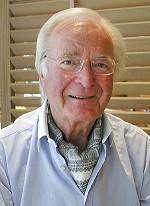
|
|||
| • Official Homepage • | |||
| • CURRICULUM VITAE • | |||
|
Following his release from captivity, he went to Hamburg. There, Martin Böttcher started his musical career with the then Nordwestdeutscher Rundfunk (NWDR), in the dance and entertainment orchestra which had been newly created by Willi Steiner, and which was held in high esteem even in England that boasted quite a few big-bands. At the same time, Böttcher's teachers of basic musical know-how were chief musical director Richard Richter, and, in the field of light music, Kurt Wege.
At first, Martin Böttcher concentrated on jazz music,
and he became the number two guitarist in a poll concerning the performance of German jazz musicians. Already at that time, he gained important experience as an arranger for several famous film composers like Michael Jary or Hans-Martin Majewski for whom he arranged, for example, part of the music for "LIEBE 47".
On February 6th, 1960 Martin Böttcher took part in the German Final of the Eurovision-Song-Contest with the song "Oh, wie schön". It was sung by the Belgian entertainer Tony Sandler, who later became a great star in Las Vegas. The broadcast is THE TV-event of the year in Germany. The song made it to an upper rank in the end. Winner was "Bonne nuit, ma cherie" by Wyn Hoop follwed by "Wir wollen niemals auseinander geh'n" sung by Heidi Brühl. | |
|
|
Martin Böttcher's merits in arranging and directing are also known to American officials. After hearing his adaptions of "Tara's Theme" and "A Summerplace" he was awarded a honorary member of the "Max Steiner Society". Of this one he is especially proud of.
|
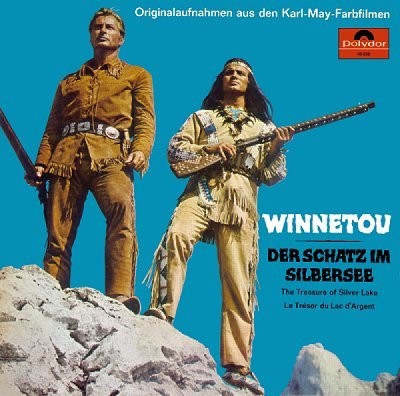 Lex Barker • Pierre Brice in The Treasure of Silver Lake (Der Schatz im Silbersee) |
With his music to German western movies, based on books by novelist Karl May,
Martin Böttcher became the leading and most successful soundtrack-writer in Germany. The
main theme of "The Treasure of Silver Lake" (1962) - the "Old Shatterhand - Melodie" - was for 17 weeks the No.1 of the music charts and was sold with more than 100.000 copies. An absolutely new feature in German music history at that time.
"Half of the success of the movie goes to the music", a critic wrote about "The Treasure of Silver Lake". And it still is a success. Some time ago a set with 5 CDs was released with the music of the Karl-May-Western movies (but regrettably it was a limited edition and is no longer available).
The successor of that series is an 8 CD-set by Bear Family entitled "Wilder Westen - Heißer Orient" (that is "wild west - hot orient") containing all available music of Karl-May-movies and also has additionally an big movie-poster-book.
Among many others Böttcher also wrote the music to numerous German Edgar- Wallace- movies (like his fellow-composer Peter Thomas), for the "Father Brown"-movies, starring famous Heinz Rühmann, as well as for many documentary and industrial films and commercials.
With the film industry declining at the end of the nineteen-sixties, Martin Böttcher increasingly focused on working for T.V. The broadcasting
companies had contacted him as early as 1962. The transition of his work from cinema to television went on without any problems, for both film and T.V., as you can se for yourself on the filmography-pages.
|
|
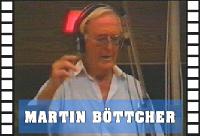 The Old Shatterhand-Melodie, being recorded in the above movie, as RealPlayer-AudioClip, 1:00 |
Old Shatterhand Melodie, 53,8 Sek. of: "Der Schatz im Silbersee" (Original-Soundtrack), |
|
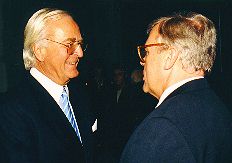
Fotos: © GEMA Many thanks to Mrs. Dr. Elfriede Oberhofer, GEMA Munich, for the color fotos. |
On the Karl-May-Fest 1994 at Bad Segeberg Martin Böttcher was awarded with the Scharlih, the oldest and most known award related to the name of Karl May. On November 9th, 1995 Martin Böttcher (on the left) was honored for his "special contribution to the history of German cinema" with the "German Film Score Award" (donated by the Deutsche Musikrat and others). On May 17th, 1996 the latest composition of Martin Böttcher "Friedensmelodie" (A Melody for Peace) had its live world premiere at the Karl-May- days at Radebeul, Saxonia. Background of this charity event was for the artists and organizers the collecting of funds for a children hospital at Mostar, Yugoslavia, where some 30 years ago the Karl-May- movies had been made (and NOT in the Alpine mountains, as the Corel All Movie Guide wants to tell you). |
|
During the Karl-May-Festival at Bad Segeberg from July, 25th - 27th 1997 Martin Böttcher was honored with the "Special Award" of the German Recording Business.
34 years after the presentation of "Winnetou II" the music is also in the disguise of Rap/Techno successful.
On September, 12th 1998 the viewers of the ZDF-hitparade (German TV-station) elected the track "...wünscht Du wärst bei mir" (featuring the Winnetou-Melodie) of the group "Superboys" as number one. (see "Discography: CD-Singles")
A cover-version of the track by the Czech group Tezkej Pokondr even was awarded with double-platinum in March 2000.
In July 1998 Martin Böttcher was honored by the GEMA-organisation for being a member for 50 years.
On April 15th, 2000 he received in Titisee-Neustadt (Black Forest) the Edgar Wallace-award in gold for his merits on German crime-movies.
The very likable and decent man today lives with his wife, actress Anneliese Kaplan (among others in: "Meines Vaters Pferde" (1953), "Käpt'n Bay-Bay" (1952)), at Lugano (Switzerland) and also for many years on the island Sardinia, where he relaxes from his full timetable preferrably with surfing. His married daughter Betsy lives in northern Germany.
By the way: the piano, Martin Böttcher composed the "Old Shatterhand Melodie" with, can be found since the beginning of the 1990ies at the Steigenberger Parkhotel in Radebeul (that is the village in eastern Germany, where Karl May was living in Saxonia).
Karl May died in 1912 and therefore 2012 his 100th obituary was celebrated - the year in which Martin Böttcher can celebrate his 85th birthday.
|
|

|
10,12 min., German - RealMediaPlayer required.
With kind permission by |
 On the DVD you will find the interview in a much better quality, of course.. |
|
Autograph-address:
Martin Böttcher
CH 6827 Brusino Arsizio/Tessin (Autograph-requests only via normal mail. Please enclose a self-addressed envelope and an international answer-coupon) |
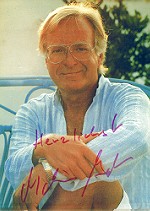
|
•
Main title collage with a foto taken from the autograph-card.
Part of the above text was written by Reiner Boller.
Foto of young Martin Böttcher taken from CD-booklet "Kriminal-Filmmusik Vol.2.
VideoClip-mastering by Videotechnik Groepler, filmed by Thomas Vogt.
Photo of the double-platinum award-presentation by Tomás Nemec.
Foto of Mr. Martin's Band taken from the CD Die Halbstarken / Endstation Liebe.
![]() top of page
top of page
![]()
![]()
![]() Martin-Böttcher - start-page
Martin-Böttcher - start-pageMartin-Böttcher-Filmography
![]()
Design / graphics / programming
© Wilfried Wittkowsky
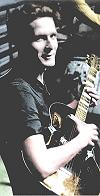
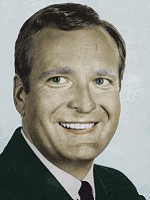 Martin Böttcher, born June 17th, 1927, in Berlin, being a great-grandson of a Weimarian court-musician, gained first musical experience when taking piano lessons at an early age. But his first
passion was flying, and he was dying to become a test-pilot. Not yet seventeen years old, he got his military training in the German Luftwaffe. However, due to lack of fuel, he never went into action. During captivity, Martin Böttcher managed to get hold of a guitar, which alone, given this situation, was quite an achievement. In do-it-yourself manner he learned how to play the guitar - a fact that showed his great musical gift and talent.
Martin Böttcher, born June 17th, 1927, in Berlin, being a great-grandson of a Weimarian court-musician, gained first musical experience when taking piano lessons at an early age. But his first
passion was flying, and he was dying to become a test-pilot. Not yet seventeen years old, he got his military training in the German Luftwaffe. However, due to lack of fuel, he never went into action. During captivity, Martin Böttcher managed to get hold of a guitar, which alone, given this situation, was quite an achievement. In do-it-yourself manner he learned how to play the guitar - a fact that showed his great musical gift and talent.
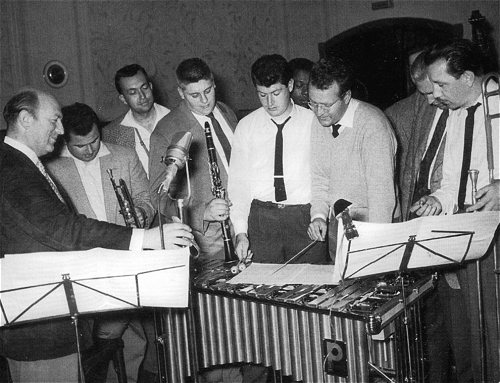 In 1946 Martin Böttcher wrote his first scripts, 1952 for small movies the first soundtracks and in 1955 the soundtrack for the first major film production ("Der Hauptmann und sein Held"). Already his second movie "Die Halbstarken" (Teenage Wolfpack, 1957) - starring Horst Buchholz (of later "The Magnificent Seven" fame) - was a big personal success. The soundtrack of this movie is now again available at "Bear Family Records" - see
In 1946 Martin Böttcher wrote his first scripts, 1952 for small movies the first soundtracks and in 1955 the soundtrack for the first major film production ("Der Hauptmann und sein Held"). Already his second movie "Die Halbstarken" (Teenage Wolfpack, 1957) - starring Horst Buchholz (of later "The Magnificent Seven" fame) - was a big personal success. The soundtrack of this movie is now again available at "Bear Family Records" - see  Five years later the world famous track HAWAII TATTOO was used in the movie "Max, der Taschendieb" ("Max, the pickpocket", 1962, with Heinz Rühmann), written by Böttcher under the name of Michael Thomas. The style of that track differed too much from his other compositions. So he decided to take an alias for this one.
It was the very first German single to enter the "Billboard Charts" in America.
Martin Böttcher's Mr. Martin's Band (above) comprised the top German jazz musicians, among them Horst Fischer, Fatty George, Bill Grah, Ernst Mosch or Hans "James" Last.
Five years later the world famous track HAWAII TATTOO was used in the movie "Max, der Taschendieb" ("Max, the pickpocket", 1962, with Heinz Rühmann), written by Böttcher under the name of Michael Thomas. The style of that track differed too much from his other compositions. So he decided to take an alias for this one.
It was the very first German single to enter the "Billboard Charts" in America.
Martin Böttcher's Mr. Martin's Band (above) comprised the top German jazz musicians, among them Horst Fischer, Fatty George, Bill Grah, Ernst Mosch or Hans "James" Last.
 "In a time when electro-bass, electro-guitar and synthesizer are rated up to date, when a rythm drawn into the foreground is being hailed as the new sound, Martin Böttcher proceeds like an interior decorator would, first spreading the soft carpet of his strings and then introducing the remaining interior for effect. "Visible music" - this term justly applied in connection with a composer and conductor like Martin Böttcher."
"In a time when electro-bass, electro-guitar and synthesizer are rated up to date, when a rythm drawn into the foreground is being hailed as the new sound, Martin Böttcher proceeds like an interior decorator would, first spreading the soft carpet of his strings and then introducing the remaining interior for effect. "Visible music" - this term justly applied in connection with a composer and conductor like Martin Böttcher."

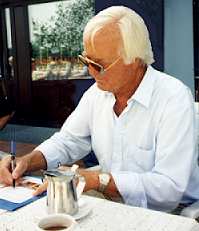 For the main theme he used the "Winnetou Melodie" of the Winnetou II-movie and the "Friedensmelodie" also found its way to the soundtrack.
For the main theme he used the "Winnetou Melodie" of the Winnetou II-movie and the "Friedensmelodie" also found its way to the soundtrack.
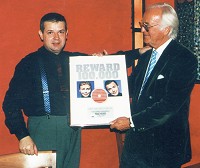 On the photo Martin Böttcher is giving the award to producer Jaroslav Kohout.
On the photo Martin Böttcher is giving the award to producer Jaroslav Kohout.
